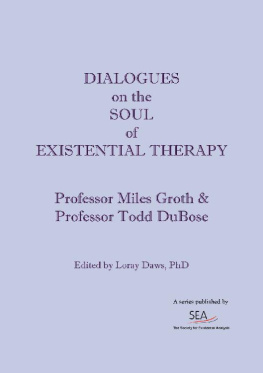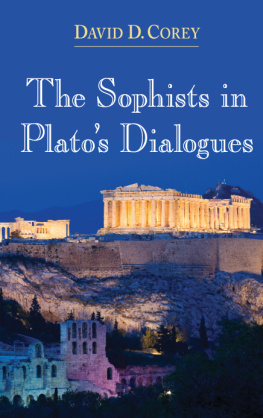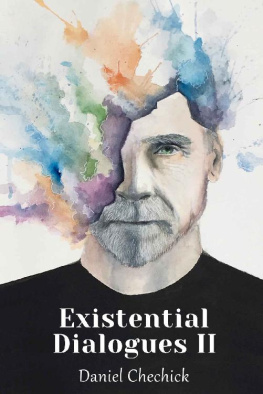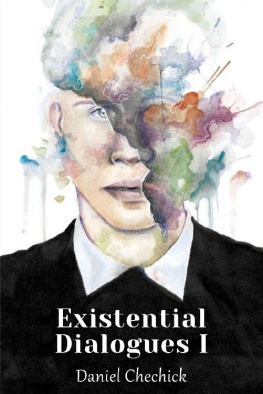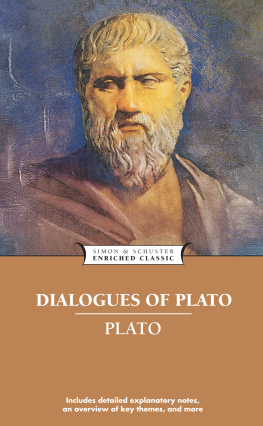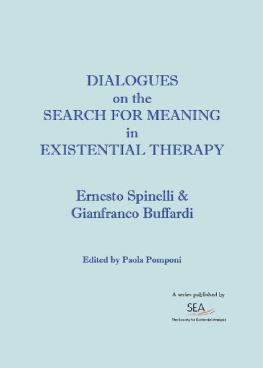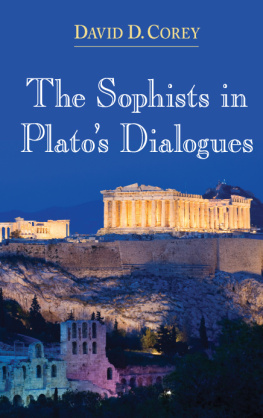Miles Groth - Dialogues on the soul of Existential Therapy (SEA Dialogues Book 2)
Here you can read online Miles Groth - Dialogues on the soul of Existential Therapy (SEA Dialogues Book 2) full text of the book (entire story) in english for free. Download pdf and epub, get meaning, cover and reviews about this ebook. year: 2020, genre: Romance novel. Description of the work, (preface) as well as reviews are available. Best literature library LitArk.com created for fans of good reading and offers a wide selection of genres:
Romance novel
Science fiction
Adventure
Detective
Science
History
Home and family
Prose
Art
Politics
Computer
Non-fiction
Religion
Business
Children
Humor
Choose a favorite category and find really read worthwhile books. Enjoy immersion in the world of imagination, feel the emotions of the characters or learn something new for yourself, make an fascinating discovery.
- Book:Dialogues on the soul of Existential Therapy (SEA Dialogues Book 2)
- Author:
- Genre:
- Year:2020
- Rating:5 / 5
- Favourites:Add to favourites
- Your mark:
- 100
- 1
- 2
- 3
- 4
- 5
Dialogues on the soul of Existential Therapy (SEA Dialogues Book 2): summary, description and annotation
We offer to read an annotation, description, summary or preface (depends on what the author of the book "Dialogues on the soul of Existential Therapy (SEA Dialogues Book 2)" wrote himself). If you haven't found the necessary information about the book — write in the comments, we will try to find it.
Miles Groth: author's other books
Who wrote Dialogues on the soul of Existential Therapy (SEA Dialogues Book 2)? Find out the surname, the name of the author of the book and a list of all author's works by series.
Dialogues on the soul of Existential Therapy (SEA Dialogues Book 2) — read online for free the complete book (whole text) full work
Below is the text of the book, divided by pages. System saving the place of the last page read, allows you to conveniently read the book "Dialogues on the soul of Existential Therapy (SEA Dialogues Book 2)" online for free, without having to search again every time where you left off. Put a bookmark, and you can go to the page where you finished reading at any time.
Font size:
Interval:
Bookmark:

DIALOGUES ON THE SOUL
OF EXISTENTIAL THERAPY
Professor Miles Groth
& Professor Todd DuBose
Edited by Loray Daws, PhD
London
First published 2020 by The Society for Existential Analysis
Typeset by Dean Andrews
All rights reserved. No part of this book may be reprinted or reproduced or utilised in any form or by any electronic, mechanical or other means, now known or hereafter invented, including photocopying and recording, or in any information storage or retrieval system, without permission in writing from the publishers.
British Library Cataloguing in Publishing Data
A catalogue record for this book is available from the British Library
ISBN 9798666727645
Acknowledgments
We want to thank Paola Pomponi and SEA for their invitation to dialogue, which we hope will invite, as the series intends, even more dialogue. We also want to express our deep gratitude to Dr. Loray Daws for his steadfast insights and graceful guidance through this editorial process. We further thank others who have supported us, and joined us, in lonely and provocative stances we have taken over the years and in this text. Our launch and sustenance into and through this project is fuelled by the depth of patience, care and love shared with us by our companion partners, for which we are grateful beyond words. They know best how this material touches us at the most personal level. Most importantly, we write these dialogues for our students and supervisees, who have come to us more than once in tears about being dismissed or ridiculed in the field as existential therapists, even at times by existential therapists. We have your back, and this is for you.
Todd and Miles
Foreword by the Editor
When asked by Miles Groth, Todd DuBose, and Paola Pomponi to serve as editor for a series of dialogues concerning soul-care between Profs DuBose and Groth I immediately leaped at the opportunity. I have known Profs Groth and DuBose for many years as supervisors and academic mentors in areas such as existential phenomenology, hermeneutics, and daseinsanalysis. I remain deeply indebted to their passion, wisdom, and commitment to depth psychology and the importance of remembering our calling as Seelsorges. I also believe that the Dialogues series as envisioned by Paola Pomponi and the Society for Existential Analysis provides the reader with a unique glimpse into core concerns facing some of our most senior practitioners in the field. It will soon become evident in the various dialogues to follow that both Profs. Groth and DuBose have completed in-depth training in psychoanalytic and existential approaches and have published and lectured widely on psychoanalysis, daseinsanalysis, existential phenomenology, and hermeneutics. Despite being extremely busy, accomplished academics and clinicians, Profs. Groth and DuBose always graciously welcome active engagement, debate, differences in opinion, and most importantly, vigorously stand-in for those unable to speak for themselves. I hope this series of dialogues will open new vistas and further conversations at the Society for Existential Analysis.
Loray Daws
Introduction
Dear Profs Groth and DuBose
It is a privilege to create a forum supporting engagement in dialogue concerning existential analysis and psychotherapy. I think for most North American readers, you are both known for your work in the field of Daseinsanalysis, existential analysis, phenomenology, hermeneutics, ethics, and modern difficulties in practicing the art of psychotherapy. I hope this dialogue can allow the readers into your respective philosophies of mind concerning existential analysis, your unique phenomenology of care, as well as the various areas to be faced for the contemporary practitioner. Given your academic and psychoanalytic training, I am confident we will gain much from your sensitive approaches. I would loathe structuring any conversations as this is an open dialogue and not a primer, although I do think you both may support us in your unique thinking on the following areas of concern:
Your views on existential hermeneutical-phenomenological praxis as it is seen and practiced in contemporary institutes;
The similarities and differences in general psychotherapeutic (CBT, DBT, Psychoanalysis) and existential hermeneutical-phenomenological approaches to care of the soul; and
Your views on the ontological and ontic press within the current therapeutic pair, that is, and to use Todds description of icide, your approaches in/to psychological living that would include (symbolically speaking) suicide (remaining unborn, escape from freedom), homicide (violence towards the Other), dasein-cide (soul murder), existence-cide (biomedical panopticism), and genocide (supremacy, nationalism, institutional arrogance).
Please feel free to add any other concerns/thoughts, and I will include it!
Warmest regards, Loray
Dialogue 1
Todd DuBose
Dear Miles,
In spite of an ever-increasing focus on no health without mental health care, and the publication of the new Wiley volume on existential therapy , I am still very concerned about the abyss of what is missed in therapeutic care across disciplines. Someone I see in therapy who just came through cancer treatment and talks of the loneliness of lying helpless on the cold treatment table waiting for radiation. He speaks of how no one wants to hear about how he is not ok as they seek only to engineer away his cancerous cells and challenge why he isnt grateful about the miracles of modern technology, all the while not understanding how his side effects change his entire world. He now has permanent damage to tasting some of his favourite foods, and trauma related to the searing and unbearable pain he endured that now mocks his heretofore competencies and imperviousness. Like the minimising phrase collateral damage in war times, side effects minimises life world destructions.
Another boy, 12, African American, growing up in a violent neighbourhood where his gender and race are targeted so much so that it is rare for him or his friends to expect to live past 18, remarked at school that he just didnt want to be around anymore in this world. The white world around him leapt to action and marked him as suicidal, which he denied, and labelled his mother as neglectful, as she did not think he needed hospitalisation. The typical algorithm of care, when faced with a very understandable assessment of lifes value, was blind to its own racism. I could go on and on, as I know you could.
We hear these stories every day, yet we are claiming that our cutting-edge care is top-notch and evidence-based. Then why is so much of the evidential not being cared for at all, or, if so, in abyss-mal ways? There is a Kafka-esque quality to not only the anonymous, faceless caregivers (read faceless as generic, algorithmic, essentialist) but the faceless suffering (read faceless here as overlooked, left out, intentionally rejected as untreatable). We therapeuts are waking up metamorphosed as bugs. I am writing these days extensively about what I am calling abyss-mal consolation or khora-tic hospitality , which is a way of caring that addresses what or who is lost or left out when we posit what is suffering, health, care or the good life. This is a postmodern way of caring with an ancient heritage in the vigil and consolation traditions. I am finding that not only does contemporary evidence-based care miss an abyss of suffering, but is also iatrogenically inducing more suffering in the way it is caring for it if it acknowledges the suffering in the first place. When I think we are caring for the abyss, a student comes to me out of the field of her training with a horror story to the contrary.
Font size:
Interval:
Bookmark:
Similar books «Dialogues on the soul of Existential Therapy (SEA Dialogues Book 2)»
Look at similar books to Dialogues on the soul of Existential Therapy (SEA Dialogues Book 2). We have selected literature similar in name and meaning in the hope of providing readers with more options to find new, interesting, not yet read works.
Discussion, reviews of the book Dialogues on the soul of Existential Therapy (SEA Dialogues Book 2) and just readers' own opinions. Leave your comments, write what you think about the work, its meaning or the main characters. Specify what exactly you liked and what you didn't like, and why you think so.

